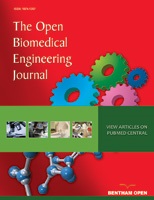
The Open Biomedical Engineering Journal
Aims and Scope:
The Open Biomedical Engineering Journal is an Open Access journal which publishes original research articles, reviews/mini-reviews, letters and guest edited single topic issues in all areas of biomedical engineering. The journal focuses on the original high-quality multidisciplinary research in the field of biosystems, including biomedical modeling; cell and tissue engineering for repair medicine; biomeasurements, biosignal processing and biosensing systems; artificial and bioartificial organs; biomaterials; biomechanics and rehabilitation, medical information systems and neuronal networks; brain-computer interfaces, communication technologies in medicine, medical imaging including brain functional magnetic resonance imaging (fMRI), genome analysis, medical physics, bioinformatics, biophotonics and optical tomography.
The Open Biomedical Engineering Journal, a peer reviewed journal, is an important and reliable source of current information on developments in the field. Emphasis is placed on publishing quality papers, making them freely available to researchers worldwide.
Read more...
The Open Biomedical Engineering Journal, a peer reviewed journal, is an important and reliable source of current information on developments in the field. Emphasis is placed on publishing quality papers, making them freely available to researchers worldwide.
Editor-in-Chief:
-
Valery V. TuchinResearch-Educational Institute of Optics and Biophotonics
Saratov State University
Saratov
Russia
ISSN: 1874-1207



